
[ad_1]
So here, I’ll be ranking the coach (or coaches) of each AFL club, from 1 through to 18.
Who doesn’t love a disagreement? So if you think I’ve ranked someone too high or too low, have your say in the comments below.
#18: David Noble/Leigh Adams (North Melbourne)
Both Noble and Adams have won the same amount of games in 2022… and Patch Adams has coached just four games.
Tells you everything you need to know.
Between Noble’s reported apology for a spray, to a list with more holes than Swiss cheese and a recruiting department that just up and walked, it’s been a tumultuous year for North.
Unless your name is Ben McKay, Luke Davies-Uniacke or Nick Larkey, no one’s made a sizeable improvement – and that’s on the coach.
#17: Leon Cameron/Mark McVeigh (GWS)
I loved ‘Spike’ McVeigh’s brutal bake of the 14 Giants who didn’t go to battle as they should have against Sydney, and the response they got against Essendon was outstanding.
However, you’ve got to take into account the fact the coach that started the year didn’t finish it.
Whoever the Giants’ next coach is, McVeigh should be a hot ticket to be an assistant either at the club or elsewhere, with his setting of standards and strength of character shining through.
#16: Ben Rutten (Essendon)
After Round 13, Essendon were 2-10.
Yep: a finals team from 2021, with a very good nucleus of young talent, started 2-10.
Why the pressure valve has been released on Rutten now that the Dons are 7-13, after a bunch of irrelevant wins with the season already shot, is extraordinary.
Put any expectation on the Dons and they go to water. Kicking into gear when the pressure is off and they can breathe shows an anxious group, whose footballing instincts aren’t up to finals standard.
That failing starts at the top.
#15: Adam Simpson (West Coast)
Simpson hasn’t had much go his way this year, with COVID ravaging the Eagles early, to ‘Nightclub-Gate’, to injuries to key midfield starters Luke Shuey, Elliott Yeo and Dom Sheed.
But there have been many times this year the Eagles have looked as bad as they have since joining the competition in 1987.
A rebuild is needed for sure, and that gives Simpson some time if the Eagles maintain he’s their man – which I don’t agree with. There also haven’t been a lot of coaching flashes of brilliance throughout games this year, especially with a near-full side available in the latter stages.
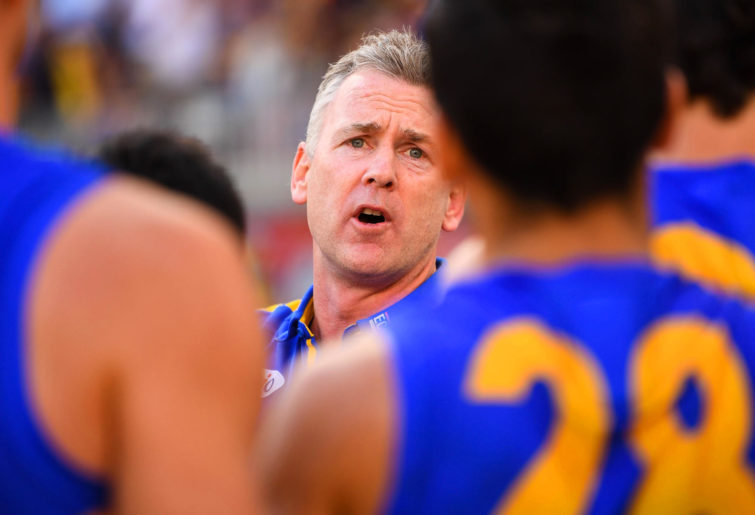
(Photo by Daniel Carson/AFL Media/Getty Images)
#14: Ken Hinkley (Port Adelaide)
I’ll be blunt – Hinkley shouldn’t be coaching Port next year.
The trajectory of Port over the last four years makes for disappointing reading: 10th, 1st (before losing a home preliminary final), 2nd (before losing ANOTHER home preliminary final), and now 12th with a fortnight to go.
After starting 0-5, their season was for all intents and purposes done already, even if they had been in some close games.
The mountain with Ken has surely been climbed: if Port weren’t good enough to get over the line and with still a largely young list, surely the board are looking at the success of Craig McRae at Collingwood and believing they could be good enough with a fresh coach.
The players love him and he does seem a good bloke. Things could work for him at another club… but do Port want to fall over themselves in loving their coach, or win a flag?
#13: Matthew Nicks (Adelaide)
The Crows have been pretty good this year, even without Matt Crouch being able to get a game for last stretches despite a midfield of Rory Laird, Ben Keays and not a lot more.
In their seven wins, they’ve looked clean and crisp for big periods. Four were really good margins, as well – but they’ve also suffered repeat comfortable losses to the best sides in the AFL, plus a 43-point defeat to Gold Coast and 59-point thrashing at the hands of GWS.
There has certainly been some improvement from the wooden spoon of 2020, but there is still a long way to go for Matty Nicks, who desperately needs to solve his third midfielder problem to get the Crows back in the finals mix.
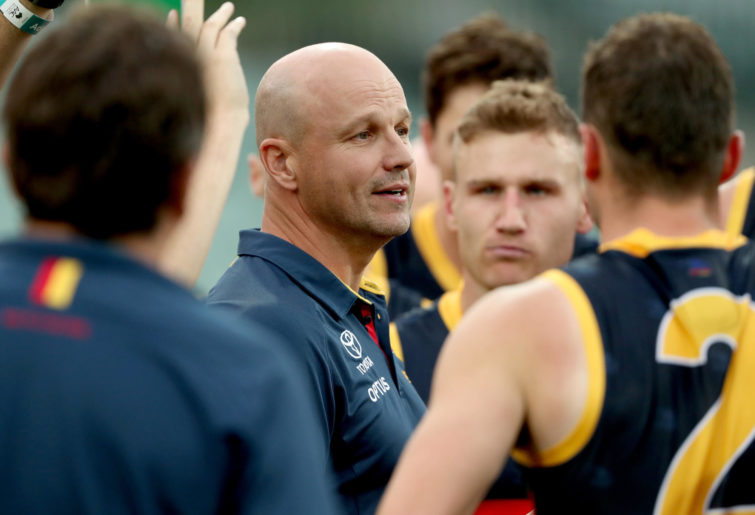
(Photo by James Elsby/AFL Photos via Getty Images)
#12: Luke Beveridge (Western Bulldogs)
Trying to be the smartest bloke on the planet doesn’t equate to good results, and the Dogs have learned that the hard way this year.
Despite supposedly one of the league’s best midfields, who have still been beaten at times, the Dogs are only just clinging to their finals hopes after a grand final last year. Their defence looks sluggish, and there aren’t a lot of threats forward of the ball.
There has been no real imagination in-game, troubling for a coach who is now six seasons off his sole flag.
Don Pyke, Leon Cameron and Nathan Buckley have all lost Grand Finals, and now don’t have jobs. If the Bulldogs had been beaten by Sydney on the big day back in 2016, would Beveridge still be in charge?
#11: Brett Ratten (St.Kilda)
If you just use the eye test, have the Saints gotten better this season?
Last year’s 10-12 result suggests they have, given they’re currently 11-9 – but the eye test is showing us the Saints are the exact same sort of mid-table side as last year.
Jack Sinclair should make the All-Australian team, Josh Battle looks at home down back, the 2021 draftees of Nasiah Wanganeen-Milera, Marcus Windhager and Mitchito Owens look really good, and Brad Crouch surged back to his peak Adelaide form.
The rest? Kind of like the Saints at the moment – middle of the road.
Max King can’t finish his good work in front of goal, Dan Butler and Jack Higgins are only threatening on their terms, and there are a lot of passengers on the Saints’ train at the moment.
Is Ratten really getting the best out of this group?
#10: Sam Mitchell (Hawthorn)
Who’d have thought that out of the three new coaches, the lowest would be at ten?
Mitchell inherited a group with veterans Luke Breust, Jack Gunston and Jaeger O’Meara still performing to an elite output.
The youth have also been extraordinary, with Jai Newcombe likely to finish top two in the best and fairest, Dylan Moore excellent, Mitch Lewis a key forward to build the side around for a decade, and 2021 draftees Josh Ward and Connor MacDonald looking like mainstayers in the side.
Hawthorn’s (and Mitchell’s) problem is there is a real gap in quality in the 24-28 age range, with Tom Mitchell, Chad Wingard and Sam Frost nowhere near their best throughout, with the latter two battling injuries.
A quick rebounding style and desire to lock the ball in the forward half has been a breath of fresh air, and the Hawks have threatened to score quickly at times.
At 8-12, with losses to Carlton, Collingwood and Melbourne adding up to 15 points combined, the Hawks seem in a really good place moving forward.
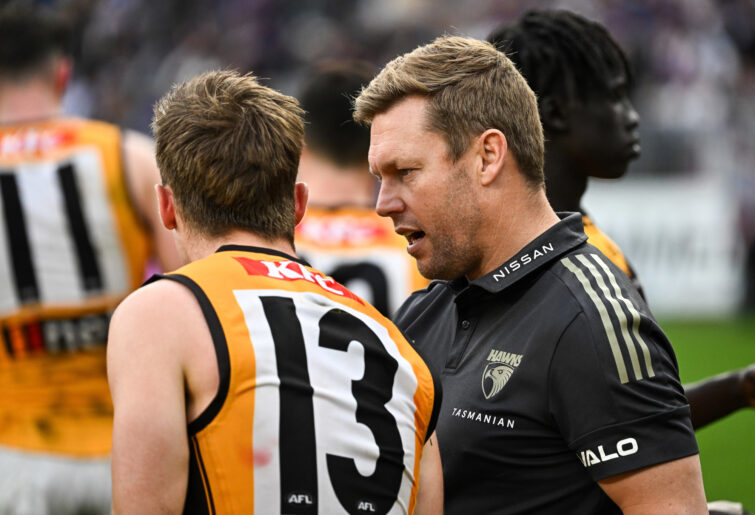
(Photo by Daniel Carson/AFL Photos via Getty Images)
#9: Chris Fagan (Brisbane)
Brisbane are still a good side, don’t get me wrong: but there’s no evidence that the side itself has gotten a lot better, despite the improvement of youngsters such as Brandon Starcevich and Keidean Coleman.
Harris Andrews and Jarryd Lyons have gone backwards in 2022, while the soon-to-depart Dan McStay has had moments to shine without Joe Daniher and Eric Hipwood, but hasn’t showed a whole lot,
Brisbane aren’t getting reliable output from their talls, which looms as costing them in finals yet again; and there has been no real improvement across the board as a footy club.
It’s the same old Brisbane. Good but not good enough.
#8: Damien Hardwick (Richmond)
‘Dimma’ personally has had an unremarkable year; but after seeing Brisbane and Hawthorn in the last 25 years fall off the planet after a multiple-premiership dynasty, credit has to be given to the Tigers for still being relevant and a probable finallist in 2022.
The fact is that with Dylan Grimes now injury-prone, Trent Cotchin a shade of his brilliant best, Jack Riewoldt in the twilight of his career and Josh Caddy retired, the Tigers could easily have tumbled down the ladder.
Where they separate themselves from the other dynasties is the fact that youth is being integrated and playing well, led by Noah Cumberland, Tyler Sonsie, Josh Gibcus and Noah Balta.
I’m not a believer in Richmond making it deep into this year’s finals, but they haven’t been anywhere near as bad as some social and footy media suggests.
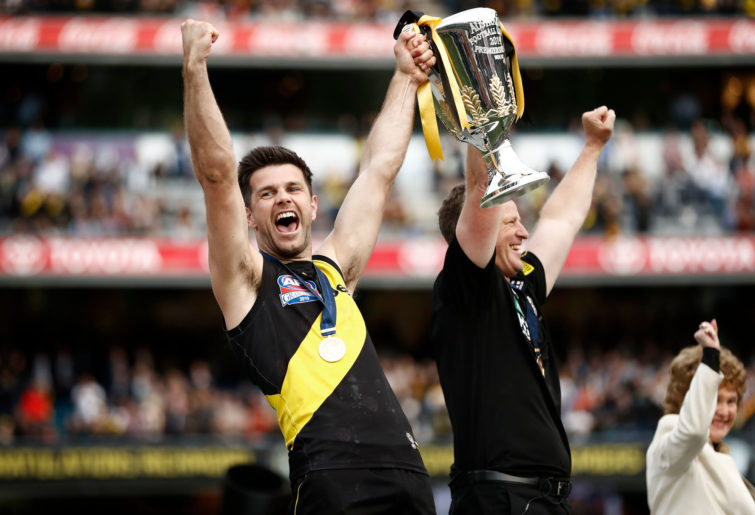
Trent Cotchin (Photo by Ryan Pierse/AFL Media/via Getty Images )
#7: Stuart Dew (Gold Coast)
Dew would be top five if the Suns made finals, but the last month has seen the dream snuffed out with losses to Essendon, Brisbane and Hawthorn.
With no Ben King, Mabior Chol and Levi Casboult have been fantastic as key forwards, whilst Izak Rankine, Joel Jeffrey and Malcolm Rosas have created a mosquito fleet of dangerous forwards.
Touk Miller is firmly in Brownlow Medal contention, Noah Anderson is one of the most improved players of the year, and the duo down back in Sam Collins and Charlie Ballard have both led the competition in intercept possessions at different points throughout the year.
There is still a bit to work on, as their half-backs, plus Matt Rowell and a third midfield option, improve; but it’s a tick for the Suns. However, after more than a decade in the AFL without September action, they need to play finals next year.
#6: Michael Voss (Carlton)
Carlton have been a joke since Brett Ratten was unceremoniously dumped as coach in 2012, but there is now a helathy respect around the place, thanks to Voss.
This is a squad that could have two Coleman Medallists by season’s end in Harry McKay and Charlie Curnow, plus two players who have finished on the podium in Brownlow Medals in Patrick Cripps and Sam Walsh. If Adam Saad makes the All-Australian team, they’ll have three AA defenders on the list as well.
The rest of the team? It still need some time; but if they make the eight from here, it would be an incredible effort.
#5: Simon Goodwin (Melbourne)
Goodwin could be a little stiff to be this low, given the Demons are sitting third, coming off a flag and have the second-best percentage in the competition.
However, Melbourne look to have plateaued, and there are teams who are improving and leaving them behind.
After a 10-0 start, they’ve since lost to Fremantle, Sydney, Collingwood (twice), Geelong and the Western Bulldogs.
The biggest difference between 2021 and 2022 is that Melbourne’s bottom half of their playing list aren’t taking great strides, though Clayton Oliver, Christian Petracca and co. have had elite years again.
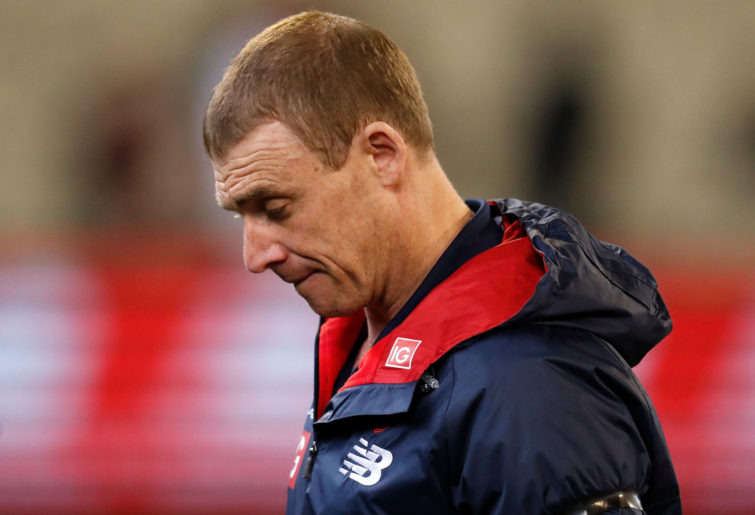
(Photo by Michael Willson/AFL Photos via Getty Images)
#4: John Longmire (Sydney)
The Swans are a genuine premiership threat, again!
Longmire hasn’t won a flag since 2012, yet the Swans are still a fresh side who are playing good football – great, even.
Xavier Ellis summed them up best when he described their style as like ‘headless chooks’. When you watch Chad Warner, Errol Gulden, James Rowbottom and Nick Blakey play, in particular, it’s spot on.
Lance Franklin is still playing okay, and will demand respect in finals. Tom Papley is impacting games more than ever, while Luke Parker and Callum Mills have been outstanding in the midfield.
The speed of attack and solidity in defence (ranked fourth) have been improved from 2021, and the SCG is back to being a fortress again – they are 17-5 there since the start of last year.
#3: Justin Longmuir (Fremantle)
The only reason I have ranked Longmuir over ‘Horse’ in this list is how unheralded his list is.
A backline of Brennan Cox, Luke Ryan, Hayden Young, Heath Chapman and Alex Pearce hasn’t been given the love from media outside of WA, whereas Tom McCartin, Nick Blakey, Jake Lloyd, Paddy McCartin (although his story absolutely needs love) and Dane Rampe have been praised plenty.
The Dockers’ midfield has had a Nat Fyfe-Andrew Brayshaw transfer of leadership, and along with Caleb Serong and David Mundy, have given them a chance to win a first final since 2015.
The way Longmuir has wrangled career best seasons from Blake Acres, James Aish, Rory Lobb, his defensive group and reinventing Liam Henry on a wing and blooding Nathan O’Driscoll as well, has been nothing short of exceptional.
The Dockers are like a few other teams in the list, in which they are not the finished product, but something good is around the corner.
Imagine when Jye Amiss and Josh Treacy get time together in the forward mix, and Neil Erasmus gets midfield time in the years to come.
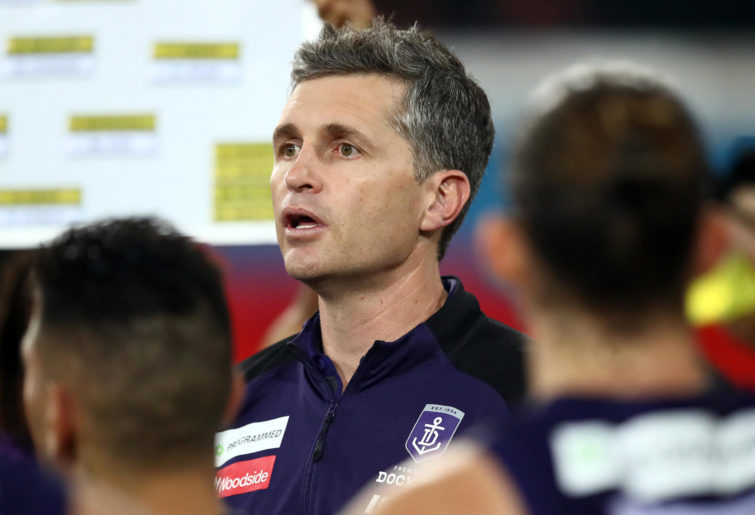
(Photo by Jono Searle/AFL Photos/via Getty Images )
#2: Chris Scott (Geelong)
Even if you are a fan of bashing the Cats, and believe they still haven’t proven anything in finals, the fact the Cats are as good as they are is still bonkers.
The Cats have gotten great things out of an ageless Tom Hawkins and a finally fit Jeremy Cameron, but the youth is what has been the standout in 2022.
Max Holmes, Brad Close, Sam De Koning, Jack Henry, Brandan Parfitt and Zach Guthrie have all been fantastic, while Mitch Knevitt, Shannon Neale and Cooper Stephens have also been blooded this year.
Whether they can stand up to finals remains to be seen; but the Cats are the clear best team in the competition at the moment.
#1: Craig McRae (Collingwood)
Surely no one outside the Holden Centre could have seen the Magpies’ 2022 coming.
The Pies are second on the ladder, having claimed eleven straight wins, with only two of them – Fremantle (36 points) and the first meeting with Melbourne (26 points) – being over two goals.
The organsed chaos style that the Pies are delivering is incredible, and with a forward line with no genuine tall, they’re doing extraordinarily well to be scoring so effectively.
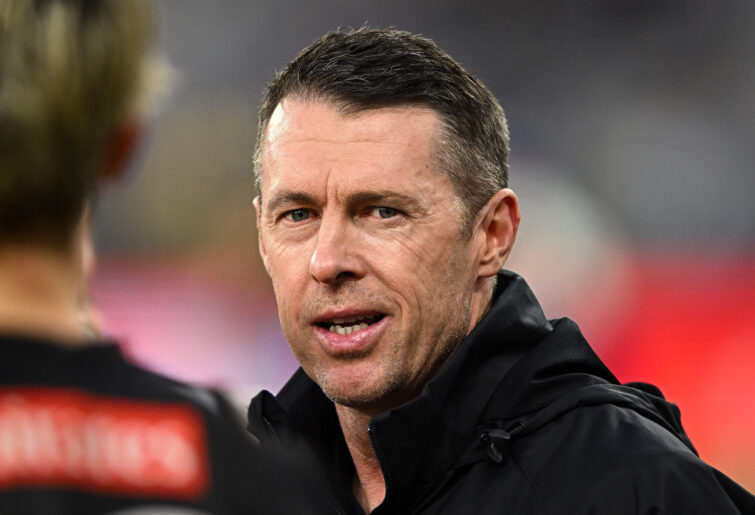
Collingwood coach Craig McRae. (Photo by Daniel Carson/AFL Photos via Getty Images)
Of the top ten teams, they are seventh for points scored and fourth for points against, so the profile mightn’t stack up compared to, say, the Cats.
However, no one can take anything away from a group that is 100 per cent invested in the game plan, and what could come next.

Leave a Reply